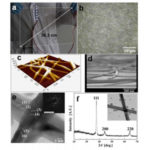 Researchers from the University of Illinois at Chicago and Korea University have developed an ultrathin, highly conductive nanomaterial produced by a supersonic spray, according to the study published in Advanced Functional Materials. The bendable, stretchable film could be used to develop wearable electronics.
Researchers from the University of Illinois at Chicago and Korea University have developed an ultrathin, highly conductive nanomaterial produced by a supersonic spray, according to the study published in Advanced Functional Materials. The bendable, stretchable film could be used to develop wearable electronics.
The film is composed of fused silver nanowires, made by spraying nanowire particles through a jet nozzle at supersonic speed. The resulting film has the electrical conductivity of silver-plate and the transparency of glass, the team reported.
The nanoparticles were suspended in water and propelled through a de Laval nozzle, which has the same geometery as a jet engine but is only a few millimeters in diameter.
“The silver nanowire is a particle, but very long and thin,” senior author Alexander Yarin said in prepared remarks. The nanomaterial is about 20 microns long – 4 of them laid end-to-end would span the width of a single human hair. The wire’s diameter is significantly smaller than the wavelength of visible light, minimizing light scattering and rendering the material transparent.
The team has applied the nanowires to a diverse array of materials, from flexible plastic films to 3D objects. “The surface shape doesn’t matter,” Yarin said. The film can be bent and stretched repeatedly and maintain its original properties, according to corresponding author Sam Yoon.

